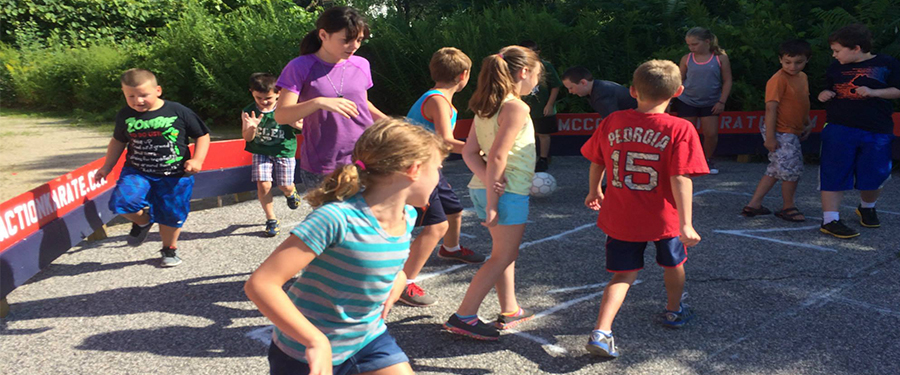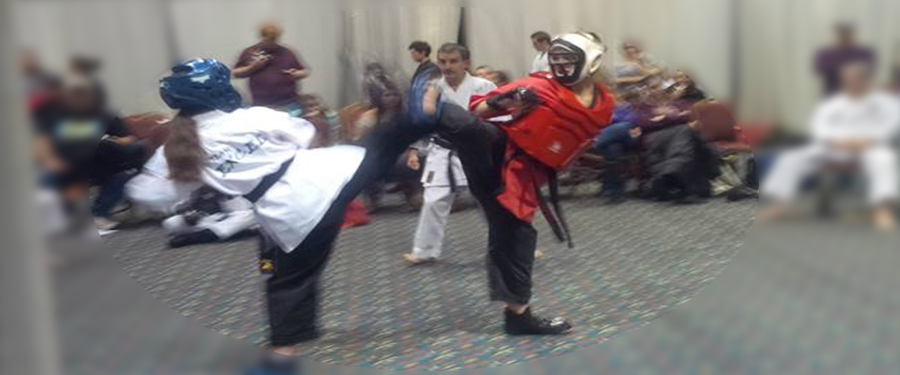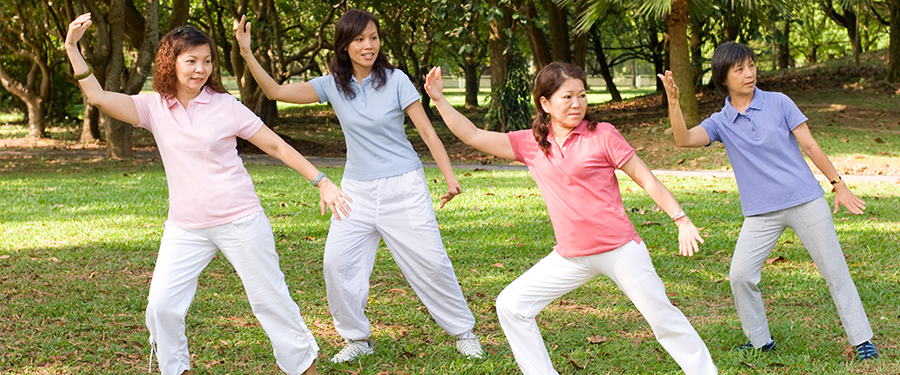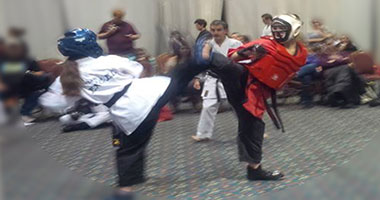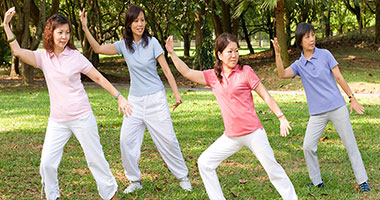Teen & Adult Karate Programs
Tang Soo Do - the Common Element
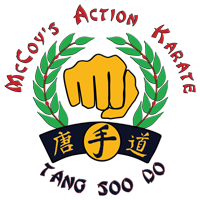 Tang Soo Do is a community art, where seniority's purpose is transmitting of knowledge and skill rather than superiority of person. Excellence is a mission in Tang Soo Do (TSD), where each student's contribution to their own art, and the art of those around them, is essential for the community to grow. For example, 4th Degree Black Belts in TSD would be referred to as Master Belts in most martial arts, particularly with the western world. In TSD, we shun the external title of mastery for one of a teacher, akin to an elder family member. Sabum, (Sabum Nim), the Korean Term we use for 4th degrees through 10th degree, implies a relationship akin to a parent, where the goal is to encourage other family members to excel beyond the confines of the senior members abilities. As in families, we strive for student ability and excellence beyond our own. Another view point is that 4th Degrees and up are senior students, rather than masters. Thus Anne McCoy, the head of our system, is titled Kwang Jang(Nim), styled
Tang Soo Do is a community art, where seniority's purpose is transmitting of knowledge and skill rather than superiority of person. Excellence is a mission in Tang Soo Do (TSD), where each student's contribution to their own art, and the art of those around them, is essential for the community to grow. For example, 4th Degree Black Belts in TSD would be referred to as Master Belts in most martial arts, particularly with the western world. In TSD, we shun the external title of mastery for one of a teacher, akin to an elder family member. Sabum, (Sabum Nim), the Korean Term we use for 4th degrees through 10th degree, implies a relationship akin to a parent, where the goal is to encourage other family members to excel beyond the confines of the senior members abilities. As in families, we strive for student ability and excellence beyond our own. Another view point is that 4th Degrees and up are senior students, rather than masters. Thus Anne McCoy, the head of our system, is titled Kwang Jang(Nim), styled 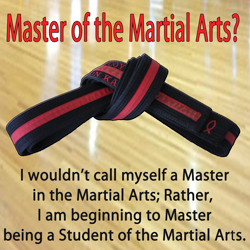 grand master by many, as our most senior student.
grand master by many, as our most senior student.
A physical core element of TSD is power and the control of power. If needed for self-defense, we train to make each single technique effective, ending the confrontation under control and as quickly as possible. These abilities and attitudes come with progression through the gup (color belt) ranks and the dan (Black Belt) ranks. Our Teen and adult programs, though separate, have common features such as the structure of our learning framework, which is explained below and is contained in 45 separate phases of the program: White Belts, Beginners, Advanced, Black Belt, and Senior Black Belts.
Belt testing is help every 4 months and students who have earned 3 or 4 of the preceding 4 stripes in each of the preceding months and have 8 classes minimum per month are qualified to graduate to their next belt. The stripes, which adhere to MAK's 6 Qualities of a Champion, insure curriculum proficiency while the minimum attendance achieves "time in belt" or training requirements. There is no magic number or formula, however, that insures graduation. If the examiner award the stripe, you have demonstrated proficiency. The is no race to black belt, only the acquisition of the life style of Tang Soo.
White Belt Phase
The Path to Black Belt starts at 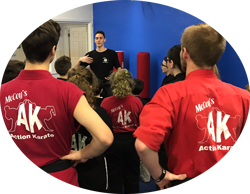 10 Gup, frequently called white belts, and required the support of the community to achieve. In Tang Soo Do. 10 gups learn foundational or basic movement is huyngs, which in other styles are called forms or patterns, name Keecho Ilbo (Basic form 1) and Keecho Hyung Eebo (basic form 2), roughly translated as first energy. First energy implies the beginning steps to develop energy in stance, movement, and striking. In addition to hyungs, the basic building blocks of Tang Soo Do, which are used to develop muscle memory and the above mentioned methods of power development, along with breathing and harmony with the environment, 10 gups learn three of the four basic kicks, upon which the over 100 kicks are based. The expectations for 10 gup is acclimation to the first energy movements, respect for the traditions of the art, and an understanding that the privilege of power is service rather than destruction. This is the hardest belt to wear, as it demands the shedding of hubris and the acceptance of assistance from those higher on the seniority chain.
10 Gup, frequently called white belts, and required the support of the community to achieve. In Tang Soo Do. 10 gups learn foundational or basic movement is huyngs, which in other styles are called forms or patterns, name Keecho Ilbo (Basic form 1) and Keecho Hyung Eebo (basic form 2), roughly translated as first energy. First energy implies the beginning steps to develop energy in stance, movement, and striking. In addition to hyungs, the basic building blocks of Tang Soo Do, which are used to develop muscle memory and the above mentioned methods of power development, along with breathing and harmony with the environment, 10 gups learn three of the four basic kicks, upon which the over 100 kicks are based. The expectations for 10 gup is acclimation to the first energy movements, respect for the traditions of the art, and an understanding that the privilege of power is service rather than destruction. This is the hardest belt to wear, as it demands the shedding of hubris and the acceptance of assistance from those higher on the seniority chain.

Beginners Phase
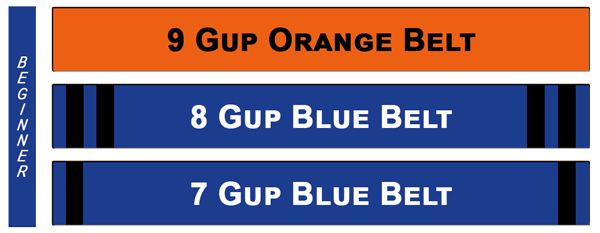 The beginner's phase in both the teen and adult classes consists on students who are 9, 8, and 7 gup, or any gup rank between 6 1/2 and 9 1/2 gup, though 1/2 gups in the beginner's phase are rarely used. The stance and movement "first energy" or foundation building continues and movements that contain more than a single change are introduces, as well as breathing, height, and the continued integration of the elements of success represented by the 6 qualities of a champion.
The beginner's phase in both the teen and adult classes consists on students who are 9, 8, and 7 gup, or any gup rank between 6 1/2 and 9 1/2 gup, though 1/2 gups in the beginner's phase are rarely used. The stance and movement "first energy" or foundation building continues and movements that contain more than a single change are introduces, as well as breathing, height, and the continued integration of the elements of success represented by the 6 qualities of a champion.
The Advanced Gup Phase
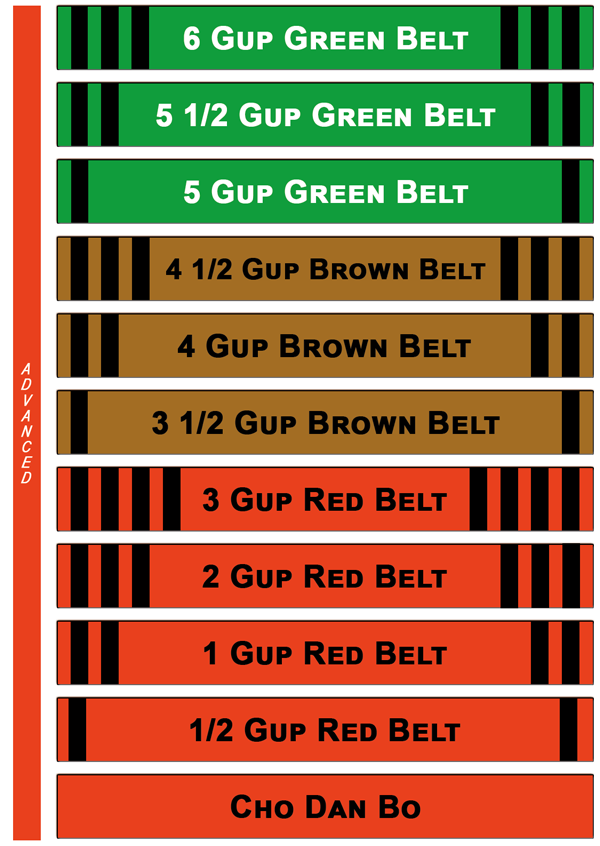 The Advanced phase of MAK's Tang Soo Do program includes gup ranks from 6 gup through Cho Dan Bo (Apprentice Black Belt) and belt the belt colors of Green, Brown, and Red. The advanced curriculum includes the bulk of the stance, movement, strikes, and defensive strikes necessary in the Tang Soo Do defense system as well as the application of the 8 Key concepts of Tang Soo Do for internal or personal development.
The Advanced phase of MAK's Tang Soo Do program includes gup ranks from 6 gup through Cho Dan Bo (Apprentice Black Belt) and belt the belt colors of Green, Brown, and Red. The advanced curriculum includes the bulk of the stance, movement, strikes, and defensive strikes necessary in the Tang Soo Do defense system as well as the application of the 8 Key concepts of Tang Soo Do for internal or personal development.
Yong Gi ~ Courage.
Chung Shin Tong Il ~ Concentration.
In Neh ~ Endurance.
Chung Jik ~ Honesty.
Kyum Son ~ Humility.
Him Cho Chung ~ Control of Power.
Shin Chook ~ Muscular Tension & Relaxation.
Wan Gup ~ Control of Speed.
The eight key concepts, when combined with the same 18 virtues taught in the children's STARS program, form the backbone of the Do component of Tang Soo Do, or the way.
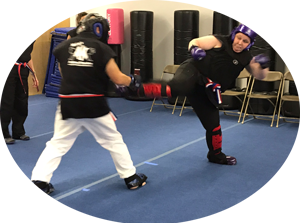 Though sparring is part of each phase of our gup training as well as Dan training, proficiency in sparring, which requires timing, concentration, endurance, integrity, humility, control or body, and proper speed control, is the hardest skill to achieve. Therefore, MAK has a teen adult version of "Fight Club" that teaches and practices the principles every week in a challenging but non-threatening way. We do not require "Fight Club" but we encourage it.
Though sparring is part of each phase of our gup training as well as Dan training, proficiency in sparring, which requires timing, concentration, endurance, integrity, humility, control or body, and proper speed control, is the hardest skill to achieve. Therefore, MAK has a teen adult version of "Fight Club" that teaches and practices the principles every week in a challenging but non-threatening way. We do not require "Fight Club" but we encourage it.
Finally, Black Belt competency, or the threshold to be invited to test for Cho Dan or 1st Degree Black Belt is not solely based on curricular competency, as that is the purpose of stripe testing and gup test. Rather, a black belt will be recognized among the ranks of gups by the outcome of their training, as expressed in the 8 key concepts, contribution to the MAK community, the community at large, and to their own development.
Dan Training
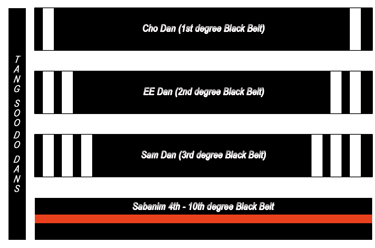 Black Belt training is the beginning of serious training, where the application of basic skills necessary to achieve this rank are put into practice and sharpened through advanced hyungs, self-defense systems where trust and violence are kept in check because of the requirements of becoming a black belt, and continued contribution to the community in the Dojang (Training Hall). Black Belt ranks are not so much goals as they are recognition of continued advancement on continued serious training. There are two ranks in Tang Soo Do. Black Belt and not yet Black Belt. The division of which rank a black belt
Black Belt training is the beginning of serious training, where the application of basic skills necessary to achieve this rank are put into practice and sharpened through advanced hyungs, self-defense systems where trust and violence are kept in check because of the requirements of becoming a black belt, and continued contribution to the community in the Dojang (Training Hall). Black Belt ranks are not so much goals as they are recognition of continued advancement on continued serious training. There are two ranks in Tang Soo Do. Black Belt and not yet Black Belt. The division of which rank a black belt  has achieved is a direct result of the training, time in, and ability to improve and is awarded by MAK's management board in recognition of those advancement. They should be considered as both a source of justifiable pride in accomplishment and by increased responsibility to be of service to others. The privilege of power continues to be service.
has achieved is a direct result of the training, time in, and ability to improve and is awarded by MAK's management board in recognition of those advancement. They should be considered as both a source of justifiable pride in accomplishment and by increased responsibility to be of service to others. The privilege of power continues to be service.

On-line ONLY Membership Offer
 Family members who train together have more fun, learn more, and get more out of the MAK community. Consider training if you are not already doing so. If you have an immediate family member, living under your roof, that already trains at MAK, then we offer substantial membership discounts for each additional family member. We are a family school, and many of 300 students are training with or at the same time as their other family members, parents, siblings, and children. Realizing that all things family tend to look good at the outset, we have a 2 week special offer program that allows our family members try out our programs without making a long term commitment. For only $29.95, your additional family member can start right now, and get 2 weeks of karate classes and a free uniform.
Family members who train together have more fun, learn more, and get more out of the MAK community. Consider training if you are not already doing so. If you have an immediate family member, living under your roof, that already trains at MAK, then we offer substantial membership discounts for each additional family member. We are a family school, and many of 300 students are training with or at the same time as their other family members, parents, siblings, and children. Realizing that all things family tend to look good at the outset, we have a 2 week special offer program that allows our family members try out our programs without making a long term commitment. For only $29.95, your additional family member can start right now, and get 2 weeks of karate classes and a free uniform.
BOGO Offer
If you take advantage of the $29.95 offer with the free uniform, and you bring a friend or a second family member, then we have BOGO (Buy one, get one) offer, where you and you friend both get 2 weeks and free uniforms. Offer limited to 2 people only. If you want to bring 2 friends, then bring four, and buy another BOGO offer.
Gift Certificate Offer
You can buy Gift certificates at the school for any occasion, even the BOGO offer. Just call Anne or Barbi at 508.832.4110 or Text MAKGifts to 87365, and we will get back to you.
Contact, Information Request, On-line offer, or BOGO
Become a Black Belt. You don't have the time, but you know you will make the time. Start today. This offer is made Only here.




